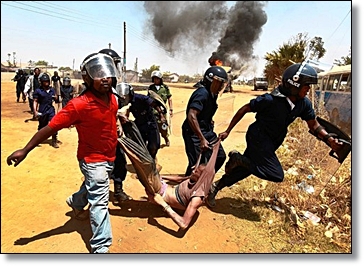Elections in Africa: Necessary?

 |
| A protestor is restrained in Zambia elections Photo courtesy |
However, notwithstanding the explanations advanced above for what characterizes elections, contemporary politics have come to contend with different forms of elections such as General elections, primary elections (usually an intra-party activity) Referendum bye election and local elections. These varied forms of election are meant to be people centered where the wishes and aspirations of the electorates are articulated thus enhancing national or community development and stability. What is peculiar about elections though is that it is not an exclusive feature of democracy but could also be found in other non-liberal political system like communism etc. In all such systems as Barun de Montesquieu would emphasize in ‘The Spirit of Laws,’ elections either in a communist, republican or a democracy ensures that the electorates alternate between being the ruled or subjects and rulers of the country. By origin, initiators of elections in Ancient Greek, Roman up to the medieval periods, saw election as a means of selecting their rulers such as the Pope, Roman Emperor, the Rashidun Caliphate, Uthman and Ali of ancient Arab, and to select the Pala King Gopala in medieval Bengal. What became known as a modern version of elections which consists of electing public officials, didn’t emerge until the beginning of the 17th century when representative governance was introduced in Europe and North America.
This essay however critically scans elections as an institution capable of reducing a nation state to a constant state of socio-economic and political instability. More emphasis will be given to the shift in purpose where elections that were designed to inject a dose of political and economic stability now degenerate into engulfing a society into perpetual instability. The findings and recommendations of this essay posit that since the consequences of holding elections especially in the quest to satisfy democratic credentials are nothing to write home about, it will be politically prudent if new researches can be undertaken to investigate whether credible alternatives can be developed in replacing elections. The base line to this assumption stems from the argument that in contemporary international relations, we continue to see states that refuse to be guided by democratic credentials, and who conduct periodic elections but yet they are relatively peaceful when you compare them to innate liberal political states. China is a classical example which holds period ‘local level’ elections, and an Electoral College type of elections to appoint their national leaders, that is socio-economically and politically stable. Political stability and economic prosperity in Communist China remain the envy to many volatile states around the world.
This essay does not pre-suppose the author’s anti-democratic or electioneering viewpoint but rather argues that since the limitations of democratic credentials like elections are sky-rocketing, it is time sovereign states begin to re-draw national representation and stability strategies without necessarily using the ballot box. The essay will highlight elections in key sovereign states and its attendant effects on the political economy and stability of such states.
By Brima Patrick Kapuwa
